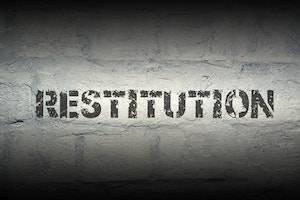Restitution in Personal and Property Damage Criminal Cases
 It has long been a criticism of the criminal justice system that criminals are afforded greater protections and rights than the accused defendant. (This emphasis on the defendant’s rights is understandable when one considers that victims are not in jeopardy of being wrongly convicted and having their freedom and/or property wrongly taken.)
It has long been a criticism of the criminal justice system that criminals are afforded greater protections and rights than the accused defendant. (This emphasis on the defendant’s rights is understandable when one considers that victims are not in jeopardy of being wrongly convicted and having their freedom and/or property wrongly taken.)
This criticism is not entirely unfounded: victims cannot choose whether the accused should accept a plea agreement, they cannot compel the accused to testify at trial and answer questions, and ultimately they cannot determine what sentence the accused should receive.
What is Restitution and Its Purpose?
Given the disproportionate emphasis on the defendant’s rights in a criminal proceeding in times past, there is increasing attention being paid to the victims of crime and the manner in which crime affects the lives of these individuals. Accordingly, many courts in Illinois and other jurisdictions order a convicted criminal to pay restitution to the individuals that his or her criminal activity harmed. The purpose of restitution is threefold:
- To help the offender appreciate the toll that his or her crime caused others;
- To ensure neither the victim nor some other innocent third party (such as an insurance company) pays for the damage the criminal defendant intentionally caused; and
- To help the victim feel as if the criminal justice system is operating to help him or her be made whole (from a financial perspective) following a crime.
What Are My Rights Concerning Restitution?
When restitution is ordered as part of the sentence in your criminal case, an order of restitution is as enforceable as any other court order. Failing to pay an order of restitution may lead to a revocation of any supervised release you were granted and/or a finding of contempt entered against you. Even though restitution is meant to benefit the victim of your crime, however, you are not without rights:
- First, you may have the right to contest having an order of restitution entered against you. If the victim’s losses are not due in whole or in part to your actions, an order of restitution may not be appropriate;
- Next, you may have the right to contest the amount of restitution you are ordered to pay. Normally, a victim is not entitled to recover non-economic damages through an order of restitution.
- Lastly, you may have the right to contest the order of restitution and your ability to pay the ordered amount. If paying a restitution order would impose a severe financial hardship upon you, the judge may decline to impose payment of the restitution order as a part of your supervision.
Count on your knowledgeable and committed Joliet criminal defense attorney from Reeder & Brown, P.C. to help you obtain the most favorable resolution of your criminal case. We can help ensure that any order of restitution sought by the victim in your case is appropriate and supported by the facts. Contact us today for assistance with your Illinois criminal charges.
Source:
http://www.ilga.gov/legislation/ilcs/fulltext.asp?DocName=073000050K5-5-6





